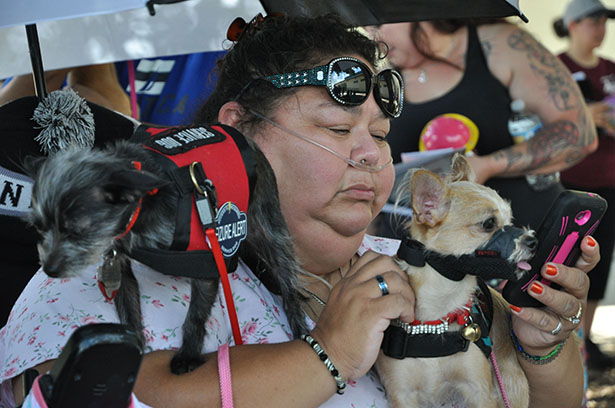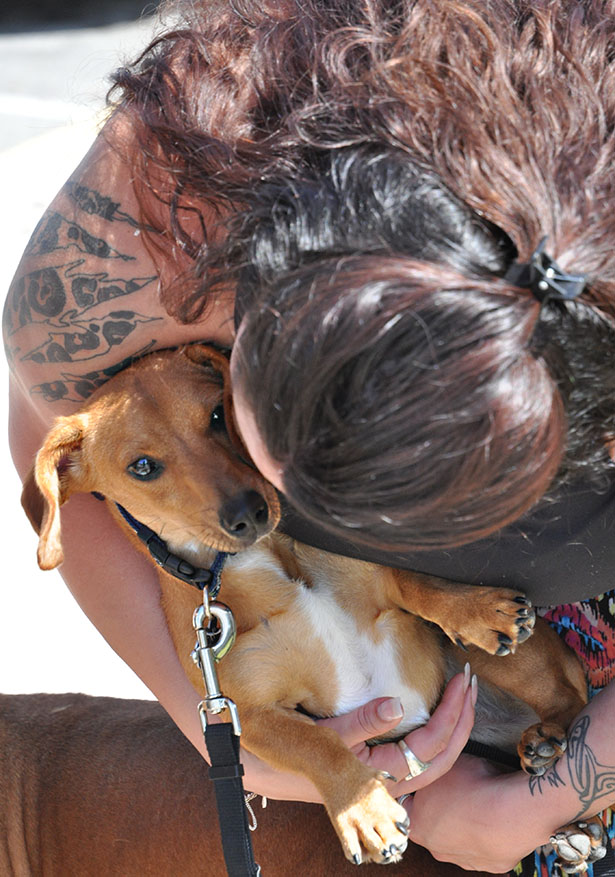By Ingrid Wilgen/@ingridwilgen
At South Side Lions Park on June 5, more than 100 pets received free microchips making them compliant with a new city ordinance. The Animal Defense League was also on-site, offering low-cost vaccinations.
“You’ll be okay, baby,” said District 3 Councilwoman Rebecca Viagran as a large Rottweiler gave a high-pitched yelp after receiving a microchip injection. The councilwoman said she was really pleased with the large turnout of residents.
Adam and Martha Jean Gomez came out to get Katy, a blonde Chihuahua, and her charcoal sister, Lilly Mae, microchipped. Both are service dogs.
Katy is a diabetic alert dog.

“She licks my arm and lets me know when it’s time to take my medication,” Gomez said. “I’ll get a little nip if my glucose level goes below 200. Lilly Mae tells me if a seizure is coming on.”
Her husband, Adam, who suffers from anxiety, said, “Lilly Mae just comes to me. She stays with me until I calm down.”
“Microchipping is a good idea,” Gomez said.
Another South Side resident, Priscilla Olivarez, stood in line with her six-month-old Chihuahua, Carmela.
“There are too many strays out there. Microchipping just makes sense,” Olivarez said.
Nearby residents came to learn more about Animal Care Services (ACS) and the Animal Defense League offered at South Side Lions Park.
“My wife texted me just a half hour ago,” Israel Salas said, sitting on the curb with his 8-year-old Dachshund, Miley. “We live down the street. I grabbed her and came quick.”
Once pets receive microchips and ACS registration, owners no longer have to renew animal licenses.
Pets labeled aggressive or dangerous still require an annual permit.
“I think that we love dogs and cats. We love keeping them, but sometimes we allow them to roam free. They mate with other animals and the population rises. We need to make sure that our animals are spayed, neutered and secured at home,” Viagran said. “This is a great way for stray pets to get back to owners quickly and safely, and it enhances pet owner responsibility.”
A New City Ordinance
Dogs and cats carry their owners information in their necks with rice-sized microchip implants. The microchips replace metal license tags for pets inside San Antonio’s City limits. Owners no longer have to pinch their fingers trying to get tags onto thick collar d-rings.
Pets receiving microchips from ACS or a veterinarian will satisfy the new city licensing ordinance that goes into effect June 30. Pet owners no longer have to renew pet licenses as microchipped animals are registered for life.
The state’s requirement of annual rabies vaccination has not changed.

Lisa Norwood, Animal Care Services information officer, said monies found in a midyear budget adjustment of the city’s general fund allows ACS to give away 5000 microchips. She predicts they will be gone by summer’s end. At that time, the microchip licensing will increase to five dollars.
The microchip showed promise last year. Animal Care Services Director Kathy Davis reported at the April 15 San Antonio City Council B session that microchipping efforts in 2014 helped to produce a 35 percent increase in Return to Owners (RTOs) and a 14 percent increase in Total Live Outcomes.
Norwood said the ordinance changed to better serve pets and their owners.
“What we were seeing with the old fashioned rabies tag is that people were not renewing them and they were falling off, getting lost,” Norwood said. “The stray pet would come into ACS with no identification, and no way for us to contact the owner. We decided on using licensing in the form of a microchip to solve these problems.”
The rice-sized microchip, encoded with an ID number easily read by a scanner, is required for dogs, cats and ferrets. The microchip serves as a permanent form of identification and the unique number is easily traced back to the owner.
Although the pet is registered with ACS, the pet owner still has to register the animal with a pet recovery database. Found Animals offers free pet registration. Premium subscriptions sold by veterinarians or third parties vary in price with some requiring an annual fee.
For more information about microchipping, contact Animal Care Services.





